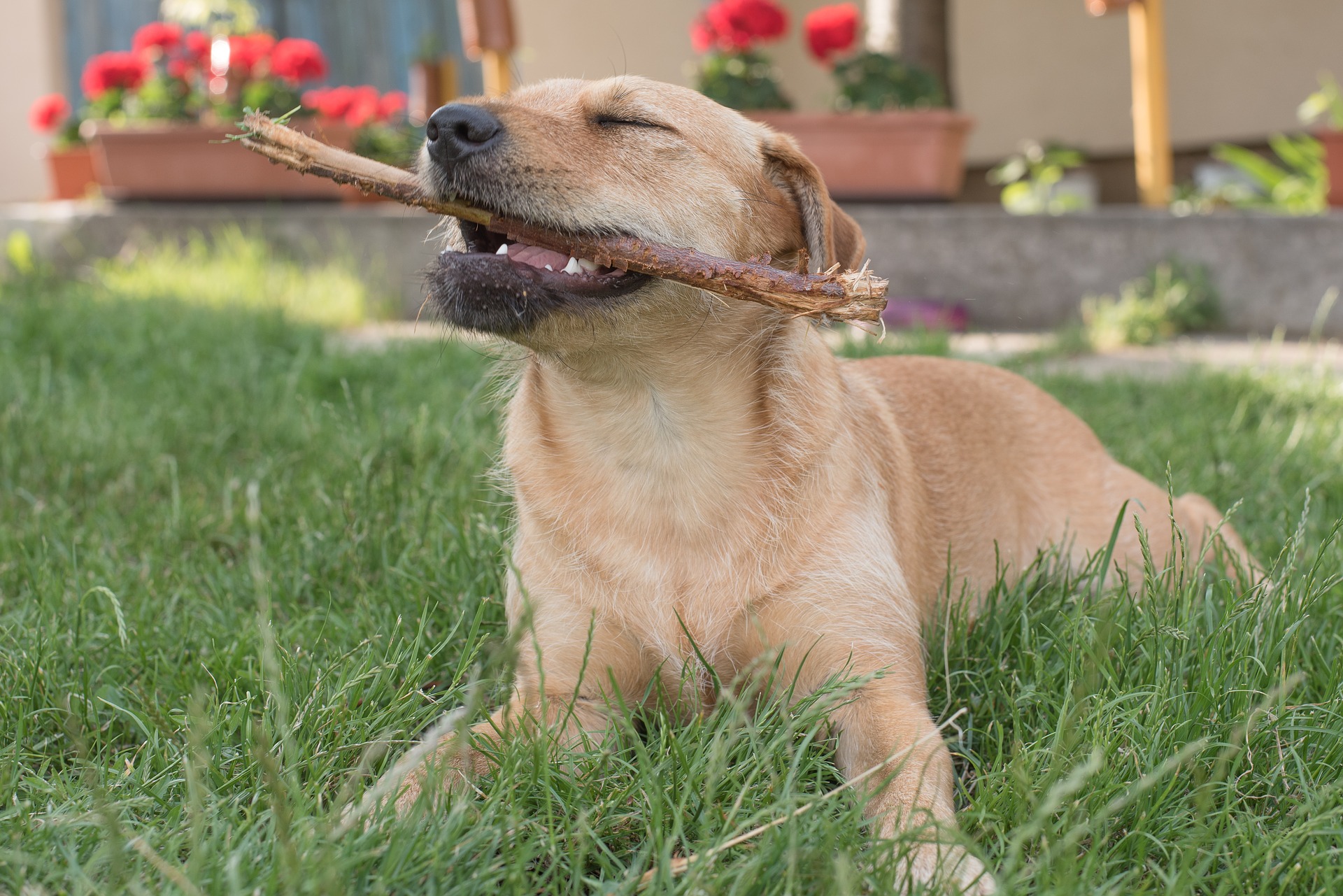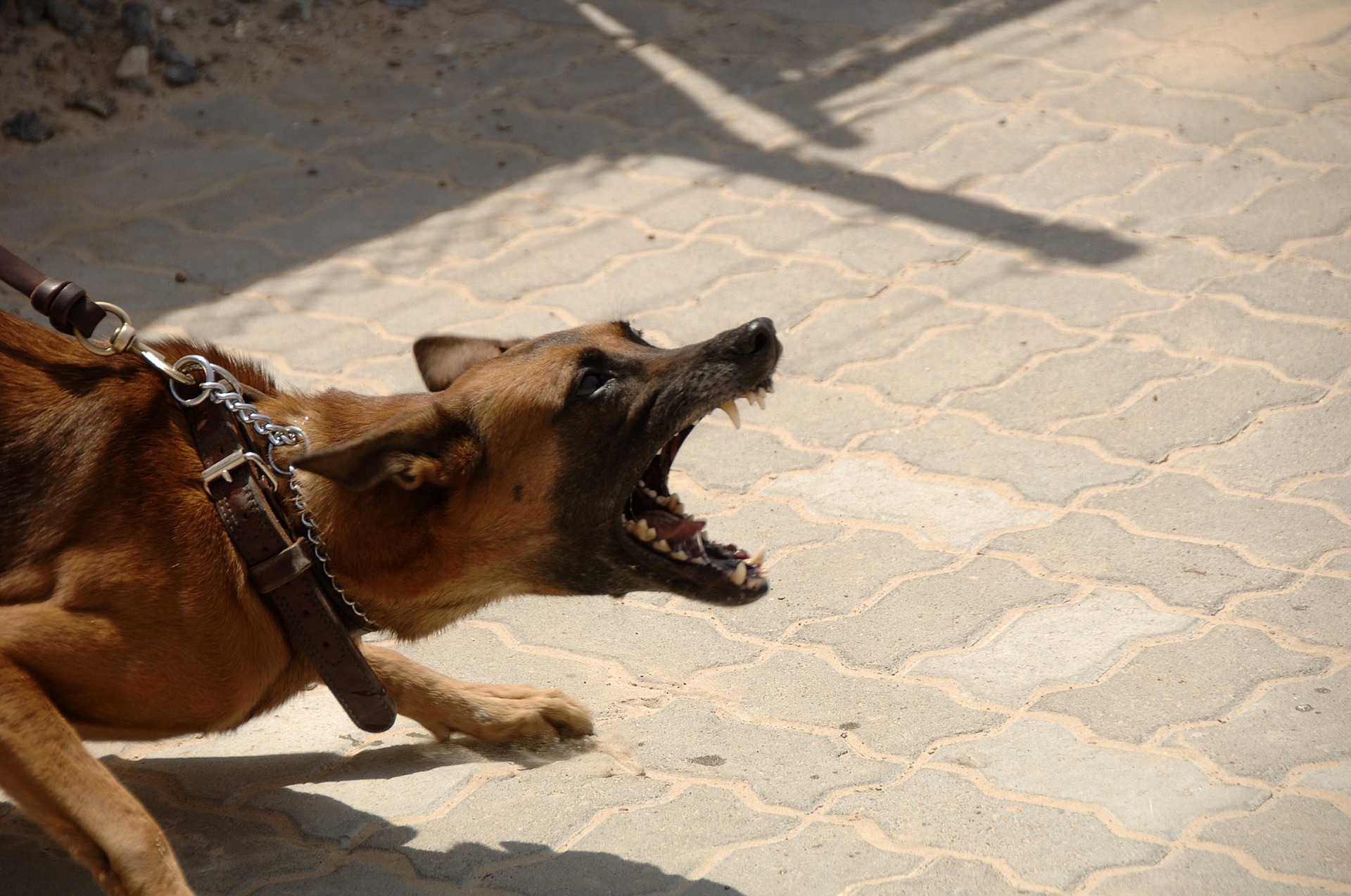If you’re googling ‘my dog barks at strangers on walks’ with ever-increasing desperation, I hear you. As do the thousands of other dog owners facing the exact same problem.
Dogs might bark for different reasons, but all those reasons have one thing in common – they’re frustrating. Not to mention embarrassing.
Even if your dog’s bark is nothing more than a friendly greeting, no one wants to be on the receiving end of a barking dog. And if those barks aren’t so friendly… well, no one wants to be that person either.
Now for the good news. If the barking is exactly that (in other words, it’s more of a general nuisance than anything else), it can often be managed effectively before it escalates into anything more serious.
The trick, as with most things doggy-related is…
a) establishing why it’s happening,
b) intervening early, and
c) staying consistent
Now, if you’re ready to stop your dog from barking up the wrong tree (or stranger in this case), the first logical step is teaching them how to be calm and in control of their emotion.
Because if you can ultimately teach your dog to relax, you’ll also find they’ll be a lot less likely to bark in any type of situation that triggers it.
So before you do anything else, I’d highly recommend checking out the short video below from Dan Abdelnoor (aka Doggy Dan) over at The Online Dog Trainer where he reveals a few powerful calming exercises to bring your dogs barking under control.
Better still, these exercises take just minutes a day to implement so they’re ideal if you don’t want to waste hours of time training.
Watch the video, apply the exercises Dan recommends to your dog routine consistenly, and you should see a marked improvement in their barking habit (or lack of it) a lot sooner than you think.
Anyway, here’s the link to take a look: Click Here To Discover How To Finally Stop Your Dogs Obsessive Barking Habit Using Simple, Powerful Calming Exercises That Takes Just Minutes A Day To Implement!
(Video will open in new window)
Common Reasons Dogs Bark At Strangers
Let’s begin by quickly outlining the general reasons dogs bark.
And once you understand this, we’ll then go into greater detail on why your dog barks at strangers on walks.
Remember that it is a natural trait. Dogs are vocal creatures and use their barking to communicate a wide variety of potential needs and wants.
But generally speaking, the vast majority of barking can be attributed to:
Territorial & Possessive
Like it or not, dogs are very territorial creatures and most will voice their discontent when they feel that their space is being violated by an unknown quantity.
Often this grows into more possessive behavior such as dominating their sleeping place and being protective over favorite toys and/or their food bowl.
And while natural, this can become an issue if they start to express their defensive side towards their owners.
Should this be the case, check out a training guide on how to stop this as early as possible.
Fear & Alarm Raising
One of the reasons why humans domesticated dogs was due to their ability to sound the alarm regarding both near and distant threats.
And while it’s easy to pigeonhole this as being territorial. It can often occur outside of the property during walks.
In this case, they tend to bark to alert you – their pack leader – of an imminent threat approaching over the horizon.
Needless to say, they will expect you to take appropriate action.
Separation Anxiety & Boredom
There are many ways anxiety can cause barking. And many owners (and neighbors) will be familiar with this when their pooch is not used to being left alone untended for long periods.
Separation barking tends to be constant with a couple of seconds between each vent.
And while it is not necessarily much to do with barking at strangers during walks. It serves as a useful distinction between anxious and panic styles.
The same is the case with bored, barking which is often performed alongside long howls.
Play Barking
Barking is common when your dog is playing and especially so when they want a stick or ball to be thrown for them to chase.
When it comes to strangers, it becomes more of a general excitement that is easily confused with aggression.
Should this be the case, all your dog is expressing is that “they look fun” and a wish and willingness to head over and say hello.
It can take a while to recognize this with your dog and distinguish between positive and negative intent.
Attention Seeking
Contrary to some trainer’s opinion there is a clear distinction between boredom barking and attention-seeking barking.
In the latter, your dog may have been exercised to near exhaustion yet still they demand your entire devotion.
Needless to say, this can become irksome within no time!
During walks, this may become evident if you are just ‘going through the motions’ of taking them around the block/park.
Remember that dogs like structure and ‘goals’ to their walks!

Why Your Dog Barks At Strangers On Walks
So as we’ve just touched upon, many dogs bark at strangers due to the excitement of seeing someone new.
But what about specifically when your dog barks at strangers on walks.
Now it’s rarely the case that they will automatically assume that strangers mean them or yourself harm, but body language is always open to interpretation.
This is why some dogs tend to become particularly excited at joggers.
Your dog is wondering why they are moving fast, and whether they could be planning on attacking them either head-on or from the flanks or rear.
But there other specific reasons why your dog may be liable to bark at strangers in public places, and many of these have their roots in their home life.
#1 – Poor Socialization Around Strangers
It is easy to assume that socialization only occurs during puppyhood.
But the truth is that while this is undoubtedly a vital stage in your dog’s development, socialization needs to be reinforced routinely over their lifespan.
Dogs who do not experience enough human contact – and we’re talking numbers here, not hours spent playing with just a couple of people – are almost certainly going to express unwanted barking towards strangers as they mature.
On the other hand, puppies and adolescent dogs who routinely encounter new faces (and other dogs) will simply become used to them irrespective of breed.
Every time you see a well-behaved dog casually enjoying a walk without a care in the world you can bet your mortgage that they were adequately socialized as a pup.
The key is finding a way to carry this over successfully into adulthood.
Effective socialization and exposure opportunities are easy to find. Just check out local walking groups or dog clubs for likeminded owners with the same objective.
And once the dog is an adult, keep them regularly interacting and you’ll face a far lower chance that they will bark at strangers for any reason.
As a final note, remember that if you are rehoming rescue dogs or taking on a pup from a ‘farm’ that they will almost definitely come ready packaged with socialization and/or exposure issues.
Integrating them into spending time comfortably around other people and pets ought to be towards the top of your priority lists. And a clear plan in place before they even arrive home for the first time.
#2 – Barking Due To Overexcitement & Pent Up Energy
It is no secret that some dogs demand much more exercise than others.
And while some will be happy to spend their life mostly dozing in their basket, others will be literally needing hours of walking and exercise every day without fail.
You’ll be able to tell whether or not your dog is receiving a suitable amount of exercise and excitement by keeping an eye on their general behavior.
Dogs who exhibit traits of boredom at home (destructiveness, attention-seeking behavior, insubordination, etc) will likely be far more difficult to control when out on walkies.
There is only so much keeping them on a tight leash can do to limit this. And if they cannot run around freely (bad idea in this case), then barking at anything that moves is their obvious fallback option.
It is important to distinguish between playful exuberance and antisocial behavior – and doing so is not as easy as many assume.
Should you provide too many unearned treats to your dog, they may assume that all people = treating opportunity, and bark and strain at the leash to try and earn stranger’s attention.
This is one of the many reasons why once again it is essential to keep to a structured training path.
WATCH VIDEO: Discover How To Finally Stop Your Dogs Obsessive Barking Habit Using Simple, Powerful Calming Exercises That Takes Just Minutes A Day To Implement!
(Video will open in new window)
#3 – Compulsive & Instinctive Barking
So far, it has been quite clear why some dogs may spontaneously bark at strangers.
But what about those whereby there is no clear-cut reason?
A minority of dogs, often those who have experienced trauma, suffer acute anxiety, or have a deeper psychological issue where they will seemingly just bark at nothing at all.
On their walk, they may just bark constantly despite there being from our perspective absolutely no point to it.
Obviously, this means that when they come across a stranger they will instinctively bark at them too, even once they have passed and are out of sight.
Establishing exactly what causes compulsive barking can be tricky and you may want to consult with a behavioral specialist to establish the next course of action.
But before doing so, it is sensible to see if you may be able to solve the issue yourself.
The following advice is a good place to start…
What To Do If Your Dog Barks At Strangers On Walks
Just as with many aspects of successful dog training it is important for you – the pack leader – to keep your cool.
Losing your temper when your dog barks at strangers on walks is going to be entirely counterproductive and simply serve to further exacerbate stress.
Never – ever – consider yanking on their leash to try and choke them into stopping barking.
Doing so will not only never work, but risks harming the animal and causing them to fear you, lose respect, and not look forward to going on walks at all.
Keep constantly calm, remain patient, and be assured that millions of owners have successfully found a way to both limit and prevent barking while walking.
#1 – Encouraging Calmness Around Strangers
Whether on a walk or relaxing at home, the key to successful canine obedience always circles around making yourself the most interesting thing in the world!
The ideal objective is for your dog not to view you as a handy source of food and shelter but as the absolute role model that they will strive to please and emulate.
Conveniently there are plenty of ways to achieve this providing you treat your dog with consistent behavior and praise.
As well as encouraging and rewarding their positive behaviors.
The easy way to do this – and it works for many aspects of training – is to make them understand that they only receive treats when they behave.
When out on walks, the moment your dog starts to bark at a passerby just stop still and totally ignore them.
Do not even make any eye contact.
Eventually, they will stop and then hold that position for around twenty seconds.
Reward them with a treat and carry on.
Inevitably, they will start up again at the next encounter.
So just stop still and repeat the above.
Over time your dog will start to understand that barking = boredom.
Not only are they stuck still, but they are barking excessively for absolutely no reason.
Yet when they are silent and chilled out, they will receive a tasty treat and be mobile again.
By no means is this an overnight fix, and it may take many months to ingrain this in your dog.
When progress appears, try and extend the quiet time by ten seconds.
And should that prove too much, simply revert back to a comfortable level and try again.
In time, persistence and perseverance will in almost all cases eventually work.
A variation of this is rather than stop still, gently turn around and lead your dog away from the focus of their attention.
It is worth trying if you have no success with staying still, but try and keep to either one or the other if possible.
It depends largely on your route and maybe a better choice if you have a winding pathway that allows for a speedy loss of line of sight.

#2 – Addressing Territorial Barking
Once again the objective is to devise something more interesting than the object of the barking.
Keep your dog on their leash and play with a toy, toss a ball/stick, anything that will distract them from the approaching stranger.
At a time of your choosing – ideally when the dog is most likely to start barking – provide them with their favorite tasty nibbles.
No matter what the distraction maybe, 99% of dogs will take a handful of tastiness ahead of barking every time.
By feeding your dog as the stranger passes by, you are not simply bribing them to stay quiet.
Instead, you are communicating that there is absolutely no threat whatsoever and you’re so confident in that, you’ll even graze on a quick snack in their immediate company.
The majority of dogs will pick up on this surprisingly quickly, and it should only take a short while for them to ‘get’ that principle.
It is up to you to be aware of your surroundings and anticipate situations whereby your dog may become super-stressed well before you walk close to them.
While your dog may gradually become used to people, they are always more likely to remain overexcited when they see other dogs who may be encroaching on their ‘turf’.
Snacks will still work, but you may need to look towards more ingrained socialization and familiarization classes to address this issue.
#3 – Praise Good Behavior
By following the two techniques listed above you will – hopefully – be well on your way to reducing your dogs barking habit before too long.
Yet it is also important to remember to reward and praise them for good behavior in order to limit the temptation to revisit old methods.
When your dog is generally comfortable going on walks without barking at strangers, be sure to give them a treat as acknowledging their good manners.
How long you ought to reinforce positive behavior is going to depend on the actual dog.
It is a good idea to continue to give treats for a considerable while – even for life – when walking them, but always be sure that they are only given as a reward for good behavior.
Do not treat using their favorites just for the sake of it otherwise, they will consider their tasty snacks as a right and not a privilege to be earned.
WATCH VIDEO: Discover How To Finally Stop Your Dogs Obsessive Barking Habit Using Simple, Powerful Calming Exercises That Takes Just Minutes A Day To Implement!
(Video will open in new window)
Final Thoughts
While dogs who bark at strangers can be disconcerting to the extent that it becomes embarrassing. Be sure to understand that it is perfectly possible to coach this unpleasant characteristic out of your dog.
Any canine can become that model of perfection we all see when out on our walkie rounds. All it requires is consistency, effort, and an appropriate schedule carefully molded towards your buddy.
The final positive to take from this article ought to be how much incorporating this training into your broader schedule will help address other existing or potential behavioral problems.
Effective socialization is the key to a happy dog and a successful relationship – and you can do it!
If you have anything you would like to add from your own experiences on why your dog barks at strangers on walks? Please feel free to add your suggestions in the comments box below.

